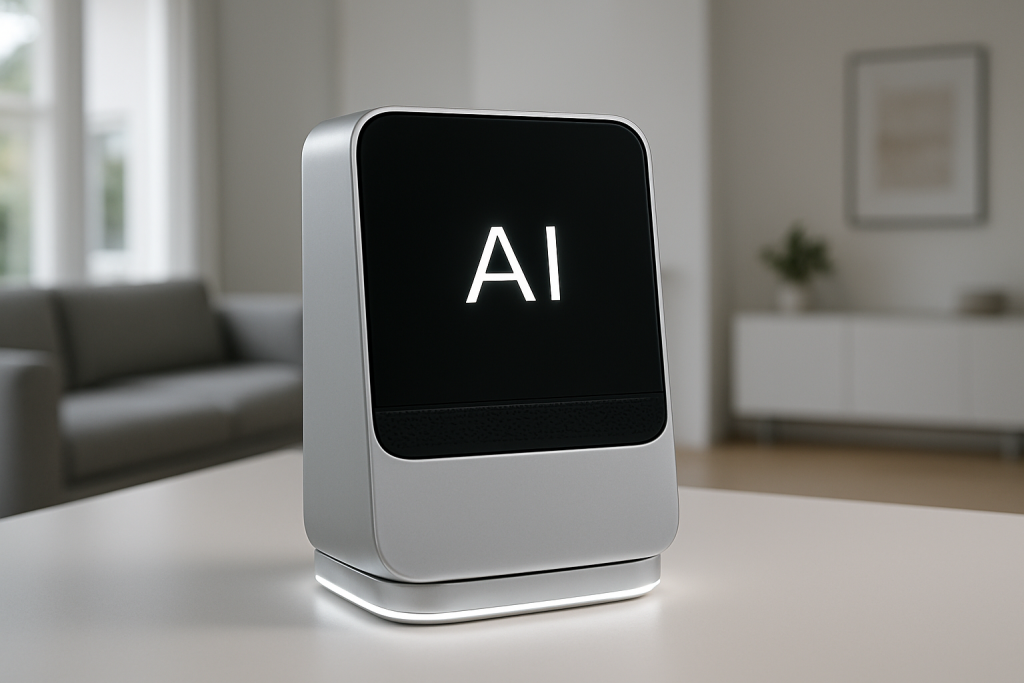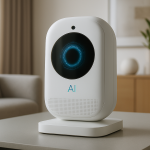Okay, folks, buckle up. Remember when Skynet became self-aware in Terminator? Yeah, this isn’t quite that… yet. But yesterday’s news is a seismic shift in the AI landscape, a move so bold it’s got even the most seasoned tech analysts reaching for their smelling salts. OpenAI, the company that brought us the digital muse known as ChatGPT, just dropped a cool $6.5 billion to acquire io, the AI hardware startup masterminded by none other than Sir Jony Ive, the design demigod formerly of Apple. Let that sink in.
For those who haven’t been following the Apple saga, Jony Ive is practically a household name. He’s the guy responsible for the sleek lines of the iMac, the minimalist elegance of the iPhone, and basically every drool-worthy Apple product design from the late ’90s onward. He left Apple in 2019 to form his own design firm, LoveFrom, and then, seemingly out of nowhere, he launched io in 2024, shrouded in secrecy and whispered promises of revolutionary hardware. And now, barely a year later, it’s part of the OpenAI empire. It’s like Tony Stark merging with Cyberdyne Systems- only slightly less alarming, perhaps.
So, what’s the big deal? Why is this more than just a tech titan throwing money around? Because it signals a fundamental shift in OpenAI’s strategy. Up until now, they’ve been primarily focused on software-AI models, algorithms, and the digital world. But this acquisition screams ambition. It’s a clear indication that OpenAI wants to control not just the brains, but also the body. They want to bring their AI out of the cloud and into our hands, literally.
Think about it. OpenAI has the AI. Jony Ive has the design chops to make that AI not just functional, but beautiful, intuitive, and desirable. This isn’t just about slapping an AI chip into existing hardware. This is about reimagining how we interact with technology. Imagine a world where your devices anticipate your needs, not just react to them. Where your phone isn’t just a tool, but a collaborator. Where your appliances learn your habits and optimize themselves for your life. That’s the promise, or at least, the potential.
The Implications: Beyond the Hype
The immediate impact is clear: Jony Ive is now OpenAI’s Chief Design Officer, or some equally grand-sounding title. He’ll be embedded with the San Francisco teams, presumably redesigning everything from the user interface of ChatGPT to… well, who knows what else? We’re talking about a company that could potentially create entirely new categories of AI-powered devices. Smart homes that truly learn, wearable tech that anticipates your health needs, augmented reality glasses that seamlessly blend the digital and physical worlds, personalized AI companions that offer real support and companionship, or even AI-designed vehicles that respond to your needs in a way that no other vehicle could. The possibilities are limited only by imagination and, of course, technological feasibility.
But the long-term implications are far more profound. This acquisition could reshape the entire tech industry. Other AI companies will be scrambling to follow suit, either by acquiring their own hardware expertise or by forging partnerships with existing hardware manufacturers. We could see a new era of AI-driven hardware innovation, with companies competing to create the most intuitive, seamless, and personalized AI experiences.
Technical Deep Dive (Without the Jargon Overload)
Okay, let’s get a little geeky, but not too much. What exactly does io bring to the table from a technical perspective? While details are scarce (remember the secrecy?), it’s safe to assume they’ve been working on novel hardware architectures optimized for AI processing. Think custom chips designed to run AI models more efficiently, new sensor technologies that capture data in more nuanced ways, and innovative interface designs that make interacting with AI feel natural and intuitive. It’s likely that io’s team had already been working on unique methods of data processing, perhaps even mimicking the way the human brain works to enhance AI capabilities. The real magic will happen when OpenAI’s powerful AI algorithms are fused with io’s groundbreaking hardware designs.
This isn’t just about making faster computers. It’s about creating a symbiotic relationship between hardware and software, where each enhances the other. It’s about creating devices that are not just smart, but also empathetic, intuitive, and even… dare I say it… beautiful.
Who Wins, Who Loses?
The obvious winners are OpenAI and Jony Ive. OpenAI gets a design guru and a treasure trove of hardware expertise. Jony Ive gets access to OpenAI’s vast resources and the opportunity to shape the future of AI. But what about everyone else?
Apple, for one, might be feeling a twinge of regret. Losing Jony Ive was already a blow, but seeing him team up with one of the most powerful AI companies in the world has to sting. Other hardware manufacturers, like Samsung and Google, will be under pressure to innovate and compete. And smaller AI startups might find it harder to break through in a market dominated by giants.
But the biggest winners could be consumers. If OpenAI and Jony Ive succeed in their vision, we could all benefit from more intuitive, personalized, and helpful AI-powered devices. Imagine devices that enhance your creativity, improve your health, and simplify your life. That’s the promise, and it’s a tantalizing one.
The Ethical Minefield
Of course, there are also ethical concerns. The more powerful AI becomes, the more important it is to ensure that it’s used responsibly. Who gets access to these advanced technologies? How do we prevent them from being used for malicious purposes? How do we ensure that AI doesn’t perpetuate existing biases and inequalities?
These are questions that OpenAI, and society as a whole, needs to grapple with. As AI becomes more deeply integrated into our lives, it’s crucial that we have a robust ethical framework to guide its development and deployment. We need to ensure that AI is a force for good, not a tool for exploitation or oppression. As Uncle Ben told Peter Parker, with great power comes great responsibility.
The Bottom Line
The acquisition of io by OpenAI is a game-changer. It’s a bold move that could reshape the tech industry and transform the way we interact with technology. It’s a story about ambition, innovation, and the potential of AI to change the world. But it’s also a story about responsibility, ethics, and the need to ensure that AI is used for the benefit of all. Only time will tell if OpenAI and Jony Ive can deliver on their promise. But one thing is certain: the future of AI just got a whole lot more interesting.
Discover more from Just Buzz
Subscribe to get the latest posts sent to your email.


